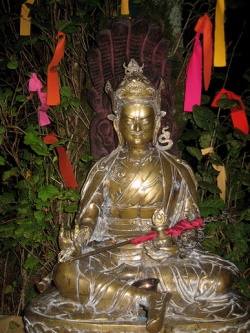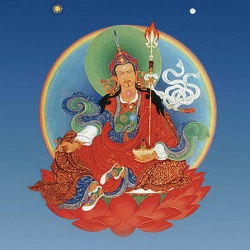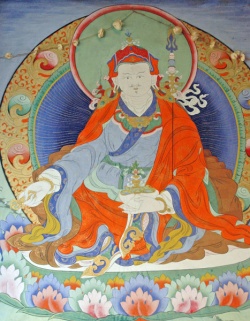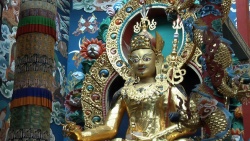Advice from Guru Rinpoche
Guru Rinpoche (Precious Guru), in his emanation as Padmasambhava (the Lotus-Born One), was born under miraculous circumstances in Northern Kashmir in the 8th century C.E. His birth was foretold by the Buddha Shakyamuni who referred to Guru Rinpoche as a ‘Buddha of Extraordinary Skill’. Padmasambhava is renowned for his ability to subdue demonic forces and to transform unwholesome activities into Dharma activities wherever his emanation appears. His compassion to help others took him to Tibet, Mongolia, China, Nepal, and all over the world, where he is known by the names of his different manifestations: Padmasambhava, Padmakara, Tsokyi Dorje, Padma Gyalpo, Shakya Senge, Nyima Odzer, Loden Chogsed, Senge Dradog, Dombi Heruka, and Dorje Drolod. As the lineage forefather of Tibetan Buddhism, Guru Rinpoche founded the first monastery Samye in Tibet (775CE). Before leaving Tibet, Guru Rinpoche, being aware of the afflictive effect of the kaliyuga (age of decadence) on sentient beings - which causes them to become timid, fearful and bewildered, as a result of the degeneration of life span, environment, perceptions, faculties and increase of negative emotions - prophesied the coming of 108 tertons (treasure revealers). Every terton will appear at a designated time in the future to uncover a specific terma (hidden treasure of Dharma) concealed expressly by Guru Rinpoche for such time when adversity and trying situations abound. Each terma is deposited in either earthly material or in the subtle mind-stream of the terton. The following teaching was given by Guru Rinpoche during his stay in Tibet:
Three Types of Dharma Engagement
- The Person of Inferior Motive engages in Dharma activities purely for the sake of well-being in future lives. Therefore, he avoids all other activities, and will certainly attain rebirth in the higher realms.
- The Person of Mediocre Motive, due to being dissatisfied with samsaric existence, engages only in virtuous activities. Therefore, he will certainly attain individual liberation.
- The Person of Superior Motive engages in the practice of bodhicitta (compassionate mind) for the sake of all beings. Therefore, he will certainly attain complete enlightenment.
Four Essential Qualities for Dharma Practice
- The person who lives by great compassion will attain the Mind of Enlightenment.
- The person who does not practice hypocrisy will be able to hold firm to the Dharma Principles.
- The person who does not practice deception will be able keep their sacred pledge.
- The person who is free from attachment will form no false friendship.
Ten Failings of being Unsuccessful in Dharma Practice
- If you do not examine all the instructions thoroughly, through the keen view of a garuda bird soaring in the skies, you will have the failing of not knowing for certain where your practice may lead to.
- If you do not gain confidence, through putting the instructions into practice, you will have the failing of being unable to incorporate the perspective of the instructions with the actions of actual practice.
- If you do not know how to practice by means of samadhi (tranquil meditative absorption), you will not attain penetrating insight of the dharmata (innate nature of phenomena and mind).
- If you do not practice in accordance to the instructions, you will not know how to practice and liberate all phenomena in your nature.
- If you do not advance gradually, through the Vajrayana instructions, you will generate samsaric consequences instead of being able to cultivate the purity needed for tantric practice.
- If you do not maintain your discipline in accordance to the sacred pledge, you will plant negative karmic seeds of an unsatisfactory future.
- If you do not redeem yourself through Dharma practice, becoming well versed with all its aspects, you will not experience the benefit of Dharma.
- If you do not adopt analytical practice to evaluate all sources of learning, you will not be able to discern the uniqueness of different schools.
- If you do not integrate the individual uniqueness of different schools into one single stream of spontaneous cognition, you will not understand that all teachings are of one flavour.
- If you do not attain illustriousness in knowledge, understanding clearly and distinctly the meaning of all teachings, you will not gain realisation of the Dharma.
Ten Types of Fantasy in Dharma Practice
- It is fantasy to claim to know the Dharma without having attended to the teaching.
- It is fantasy to claim you have supra-mundane powers without having accomplished the development stage of Tantric practice.
- It is fantasy to claim you have received the blessing of the Holy Gurus without having engaged in devotional practice.
- It is fantasy to claim you have attained enlightenment without having engaged in meditation practice.
- It is fantasy to claim you have found a master without serving him.
- It is fantasy to claim you are to be liberated through a means that does not have the support of lineage.
- It is fantasy to claim you have attained realisation without the oral transmission from the Spiritual Guru.
- It is fantasy to claim your being is liberated without having engaged in any Dharma practice.
- It is fantasy to claim you have practised without having engaged in sincere effort.
- It is fantasy to claim you are blessed with beneficial conditions without having kept the sacred pledge to the Holy Gurus.
Ten Signs of Having Practised the Dharma
- It is the sign of having realised the natural state of pure awareness, if you can put all mental deliberation to rest.
- It is the sign that the oral transmission from the Spiritual Guru has become effective, if the discriminating awareness wisdom manifests without partiality.
- It is the sign you have generated devotion to your Spiritual Guru, if you perceive your Guru as a manifestation of Buddha.
- It is the sign that the lineage of the siddhas (the attainment resulting from Dharma practice) is intact, if you continue to receive blessings of beneficial conditions.
- It is the sign that you have accomplished the full potential of discriminating awareness, if you can continually adjust the boundaries of your awareness with ease.
- It is the sign that you have attained the essence of prana-mind (energy of pure consciousness), if you do not feel exhausted in spite of continuous practising through day and night.
- It is the sign that you have attained the essence of meditationf there is no variance in discriminating awareness, whether you appear to be practising or not practising.
- It is the sign that you are able to perceive the manifestation of form, as a tool to assist your advancement on the path to enlightenment, if you can maintain the awareness of dharmata (innate nature of phenomena and mind), regardless of whatever thought or form may appear to you.
- It is the sign that you have the spontaneous ability to subdue the five poisons (anger, ignorance, pride, desire, envy), if they do not arise in your mind, or even if they do, are instantly rendered harmless.
- It is the sign that you have understood impermanence as being the stamp of samsara, if you are unhindered by sufferings and obstacles.
Twelve Invaluable Factors of Harmonious Dharma Practice
- Learning, contemplating and meditating are the three basic components of harmonious Dharma practice.
- Perseverance, faith and reliance on the Spiritual Guru are the three essential principles which support harmonious Dharma practice.
- Wisdom, and integrity are the three essential properties of harmonious Dharma practice.
- Joyful detachment, non-sectarian view, and mental agility are the three vital constituents of harmonious Dharma practice.
Eight Kinds of Silence in Dharma Practice
- With silence of the body, without fanatical fixation, you will avoid the allurement of violation.
- With silence of the speech, you will keep your practice free from mindless rhetorical diversion.
- With silence of the mind, you will not be affected by mindless deliberation. Thus, enabling you to reside in the pure consciousness of dharmakaya (the non-dualistic primordial mind), without the hindrance of ordinary cognisance.
- With silence of sense-gratification, you will set yourself free from the conceptual fixation of pure and impure experiences. Thus, enabling you to be blessed with an existence devoid of conflict, and bring about the protective influences of the Tantric Assembly.
- With silence of transmission, do not offer instruction to people who are unsuited for such teaching. Thus, enabling you to receive the blessing of the lineage.
- With silence of behaviour, act unpretentiously and without deceit. Thus, enabling you to make advancement and protect the mind from afflictive influences.
- With silence of experience, do not form attachment with your experience, and do not elaborate your encounter to others. Thus, enabling you to attain full enlightenment in this lifetime.
- With silence of realisation, do not cling to mundane longing and reside in the calm abiding of non-duality. Thus, enabling you to be free from the bondage of samsara in the moment of realisation.
The State of Effortless Being
- When there is no attachment to duality, the view of reality is effortless.
- When there is no attachment to lethargy, restlessness and mindless diversion, meditation is effortless.
- When attachment to mundane concerns is dissolved, spontaneous action is effortless.
- When the mind is cleansed of its mental defilement, experience is effortless.
- When the mind is separated from affliction, it is effortless to reside in the pure consciousness of dharmakaya (the non-dualistic primordial mind).
- When affection for partiality is removed, compassion is effortless.
- When propensity to clinging is eliminated from the mind, generosity is effortless.
- When recognising all worldly pursuits to be illusory, appreciation of life is effortless.
- When your action is free of conceit and arrogance, your daily undertaking is effortless.
- When you do not live in accordance to mundane concerns, choice of livelihood is effortless.
- When you no longer engage in inter-personal rivalry, relationship with others is effortless.
- When you no longer engage in immature, egocentric conduct, the state of your being is effortless.
- When in attendance of a Noble Guru who is the embodiment of compassion and wisdom, one’s state of being is effortless.
- When you recognise the essence of enlightenment is present in all sentient beings, it is effortless to develop familial affection towards them.
- When you have succeeded in abandoning attachment, whatever you do becomes effortless.
- When relative truth and ultimate truth become one, it is effortless to realise pure happiness.
- When recognising visions and sounds to be illusory, it is effortless to dissolve suffering.
- When realising your true nature, it is effortless to avoid exertion and conflicts.
- When recognising thoughts as phenomena of the mind, it is effortless to use any object for meditation.



